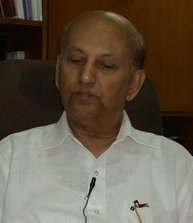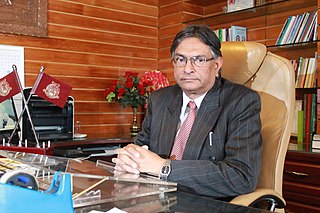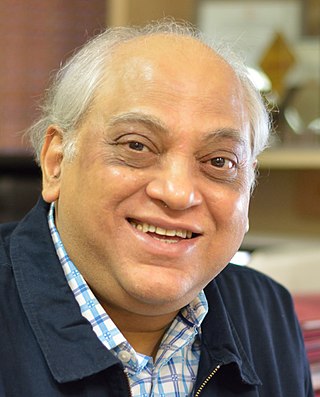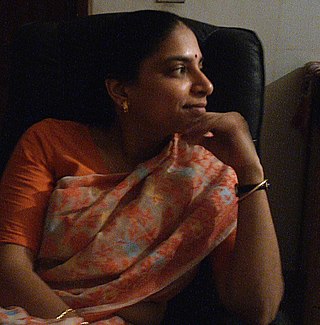
Udupi Ramachandra Rao was an Indian space scientist and former chairman of the Indian Space Research Organisation. He was also the Chairman of the Governing Council of the Physical Research Laboratory at Ahmedabad and Nehru Planetarium at Bengaluru and chancellor of the Indian Institute for Space Science and Technology (IIST) at Thiruvananthapuram. He is known as "The Satellite Man of India". He pioneered India's first satellite launch Aryabhata in 1975.

Jawaharlal Nehru University (JNU) is a public major research university located in New Delhi, India. It was established in 1969 and named after Jawaharlal Nehru, India's first Prime Minister. The university is known for leading faculties and research emphasis on social sciences and applied sciences.

Chintamani Nagesa Ramachandra Rao,, is an Indian chemist who has worked mainly in solid-state and structural chemistry. He has honorary doctorates from 84 universities from around the world and has authored around 1,774 research publications and 56 books. He is described as a scientist who had won all possible awards in his field except the Nobel Prize.

Narayansami Sathyamurthy is a chemist in India. He is the founding director of the Indian Institute of Science Education and Research (IISER), Mohali, Punjab, India and the President of Chemical Research Society of India.
Tan Chung is an authority on Chinese history, Sino-Indian relations and cultural exchange. He has been a doyen of Chinese cultural studies in India for nearly half a century.

Talat Ahmad is an Indian Earth scientist and professor at department of Geology, University of Delhi. He commenced his second stint as vice chancellor of University of Kashmir on 6 August 2018 after serving as vice chancellor of Jamia Millia Islamia, he resigned from the post a few months short of his full term. He was shortlisted by a committee constituted by the governor to shortlist a panel for the post. He had earlier taken over as vice-chancellor of University of Kashmir from Professor Riyaz Punjabi on 1 June 2011. Prior to this, he was teaching geology at the University of Delhi.

Amitabha Chattopadhyay is an Indian scientist working in the areas of membrane and receptor biology and biophysics. He is presently a CSIR Bhatnagar Fellow at the Center for Cellular and Molecular Biology and served as the founding dean of biological sciences at the Academy of Scientific and Innovative Research (AcSIR). In addition, he is a distinguished visiting professor at the Indian Institute of Technology Bombay, adjunct professor at the Jawaharlal Nehru University, Tata Institute of Fundamental Research, Indian Institute of Science Education and Research (Kolkata), Swinburne University of Technology (Australia), and honorary professor at the Jawaharlal Nehru Centre for Advanced Scientific Research (Bangalore). He was elected a Fellow of the Royal Society of Chemistry in 2013 and Royal Society of Biology in 2017. Chattopadhyay has authored more than 300 research papers and has an h-index of 65.
Sudha Bhattacharya is an Indian academic, scientist and a writer. She is recognized primarily for her in-depth study of Entamoeba histolytica, a parasitic protozoan that causes amoebiasis: Dr. Bhattacharya's laboratory first detected Ribosomal RNA genes on Circular DNA, while studying the parasite, and also discovered families of retrotransposons in the parasite genome. Her work has primarily been in the fields of Molecular Parasitology and Gene Regulation.

Charusita Chakravarty was an Indian academic and scientist. She was a professor of chemistry at the Indian Institute of Technology, Delhi since 1999. In 2009 she was conferred Shanti Swarup Bhatnagar Prize for Science and Technology in the field of chemical science. In 1999, she received B.M. Birla Science Award. She was an Associate Member of the Centre for Computational Material Science, Jawaharlal Nehru Centre for Advanced Scientific Research, Bangalore.
Goverdhan Mehta FNA, FASc, FTWAS, FRS, FRSC is an Indian researcher and scientist.
Prasenjit Sen is a professor at the School of Physical Sciences of Jawaharlal Nehru University, New Delhi, India.

Rajpal Singh Sirohi is an Indian optics physicist, academic administrator, educator, and researcher in optical metrology. He is the former Director of IIT Delhi and Vice Chancellor of several universities. He is the Fellow of INAE, NASI, OSA, SPIE, OSI and ISoI. He has received numerous awards including Gabor Award of SPIE, Galileo Award of ICO. He is also the recipient of Padma Shri by Govt. of India. He is the author of about 430 papers and several books.
Asis Datta is an Indian biochemist, molecular biologist and genetic engineer, known for his research on genetically modified foods and food nutritional security. He was the founding Director of the National Institute of Plant Genome Research and is credited with the discovery of genes that assist in extended preservation of fruits and vegetables. He is a recipient of the Shanti Swarup Bhatnagar Award, the highest Indian award and in the Science category, and was awarded the fourth highest civilian award of the Padma Shri, by the Government of India, in 1999. In 2008, he was included again in the Republic Day Honours list for the third highest civilian honour of the Padma Bhushan.
Sudhir Kumar Sopory is an Indian educationist, plant physiologist, scientist and former vice chancellor of Jawaharlal Nehru University, New Delhi. He is known to be the first to purify a protein kinase C activity from plants and is credited with the identification of topoisomerase as a substrate of protein kinase C. He is an elected Fellow of several major Indian science academies and The World Academy of Sciences (TWAS) and is a recipient of many honours, including the 1987 Shanti Swarup Bhatangar Prize, the highest Indian award in the science and technology categories. The Government of India awarded him the fourth highest civilian honour of the Padma Shri, in 2007, for his contributions to science and technology.
Alok Bhattacharya is an Indian parasitologist, academic and a professor at the School of Life Sciences of the Jawaharlal Nehru University. He chairs the Biotechnology Information System Network (BITSNET) as well as the Life Sciences Expert Committee of FIST program of the Department of Science and Technology (DST). He is an elected fellow of the Indian Academy of Sciences and the Indian National Science Academy and is known for his studies on Entamoeba histolytica and species-specific calcium binding protein and its gene.
Subramanian Anantha Ramakrishna is a professor of physics in Indian Institute of Technology Kanpur specializing in optics and condensed matter physics. He was awarded the Shanti Swarup Bhatnagar Prize for Science and Technology, India's highest prize for excellence in science, mathematics and technology, in the physical sciences category in the year 2016. Ramakrishna obtained M.Sc. degree from Indian Institute of Technology Kanpur in 1995 after pursuing the integrated 5-year M.Sc. programme and secured Ph.D. from Raman Research Institute, Bangalore, in 2001 for a thesis titled "Light transport and localization in Active and passive random media" written under the supervision of Prof. N. Kumar. He spent two years in Imperial College, London, as a postdoctoral researcher and joined Indian Institute of Technology Kanpur as an assistant professor in May 2003, where he now holds the position of professor. In July 2020, Prof. Ramakrishna took charge as Director of the CSIR-Central Scientific Instruments Organisation in Chandigarh on lien from IIT Kanpur.
Kambadur Muralidhar or K. Muralidhar is an Indian biologist, known for his work in biochemistry, endocrinology and reproductive biology. He taught at Delhi University for over thirty years, and was Head of its Department of Zoology. Currently, he is Jawaharlal Nehru Chair Professor, School of Life Sciences, University of Hyderabad. He is a Fellow of the Indian National Science Academy, the Indian Academy of Sciences and the National Academy of Sciences, India. He is also highly regarded as a teacher and educator, and has contributed to biology education at both high school and college levels.

Mamidala Jagadesh Kumar is an Indian academician, electrical engineer, education administrator. He is currently the chairman of University Grants Commission, since February 2022. He is a professor in the Department of Electrical Engineering at IIT Delhi. Kumar also served as the VC of JNU from in January 2016 to 2022.
Kanishka Biswas is an Associate Professor in the New Chemistry Unit at Jawaharlal Nehru Centre for Advanced Scientific Research, Bangalore with research interests focused on renewable energy and clean environment. The areas in which he has worked include solid state inorganic chemistry of metal chalcogenides, thermoelectric materials, 2D layered materials, topological insulators.








